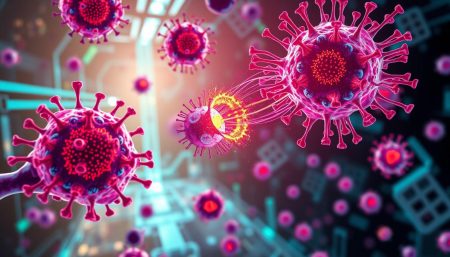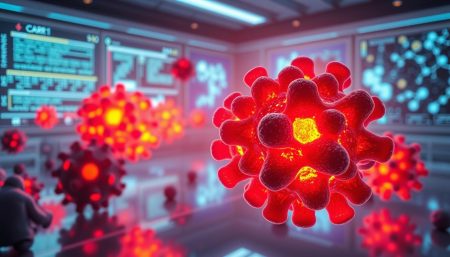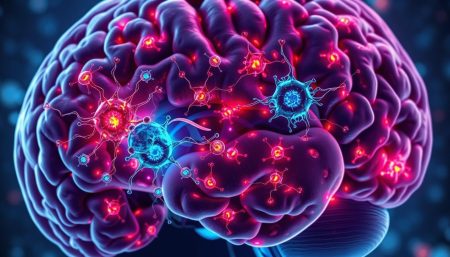Immunotherapy is changing how we treat cancer. It uses the body’s immune system to fight cancer cells. Chimeric antigen receptor (CAR) T cell therapy is a key part of this, showing great results in treating blood cancers like lymphoma. Anti-CD19 CAR T cell therapy targets the CD19 protein on B cells. This makes it a strong treatment for B-cell cancers. It works by changing a patient’s T cells to find and kill cancer cells.
Researchers are working to make this therapy safer and more effective. They’re using new techniques to improve how well it works. This includes making CAR T cells that last longer and work better against tumors.
This article looks at the latest in anti-CD19 CAR T cell therapy. We explore its importance, the results of new studies, and how it helps patients. We also talk about the challenges ahead and the importance of supporting patients on their journey to recovery.
Understanding CAR T Cell Therapy
CAR T cell therapy is a new way to fight cancer. It uses a patient’s own immune system to attack cancer cells. This personalized medicine approach offers hope for those with aggressive cancers.
What is CAR T Cell Therapy?
CAR T cell therapy is a form of adoptive cell transfer. It changes a patient’s T cells to fight cancer. The T cells are made to find and kill cancer cells.
To start, a patient’s blood is taken. T cells are then taken from this blood. These T cells are changed in a lab to fight cancer.
After they are grown, the T cells are given back to the patient. They then find and kill cancer cells.
How CAR T Cell Therapy Works
The success of CAR T cell therapy comes from its special receptors. These receptors have three parts:
- An outside part that finds and sticks to cancer cells
- A middle part that holds the receptor on the T cell
- An inside part that starts the T cell’s attack
When CAR T cells find cancer cells, they bind to them. This starts the T cell’s attack. The T cells then kill the cancer cells.
This therapy works best against B-cell cancers. It targets the CD19 antigen on these cancer cells. This way, it kills cancer cells without harming healthy ones.
The Significance of Anti-CD19 CAR T Cells
Anti-CD19 CAR T cell therapy is a game-changer for B-cell malignancies. It brings new hope to those with relapsed or refractory disease. This therapy targets CD19 because it’s unique to B-cells and vital for their growth and function.
CD19 is a perfect target for CD19-targeted CAR T cells for several reasons:
- CD19 is found on almost all B-cell cancers, like lymphomas and leukemias.
- It’s not on other cells, which means fewer side effects.
- CD19 is key for B-cells to live and grow, making it a major player in cancer.
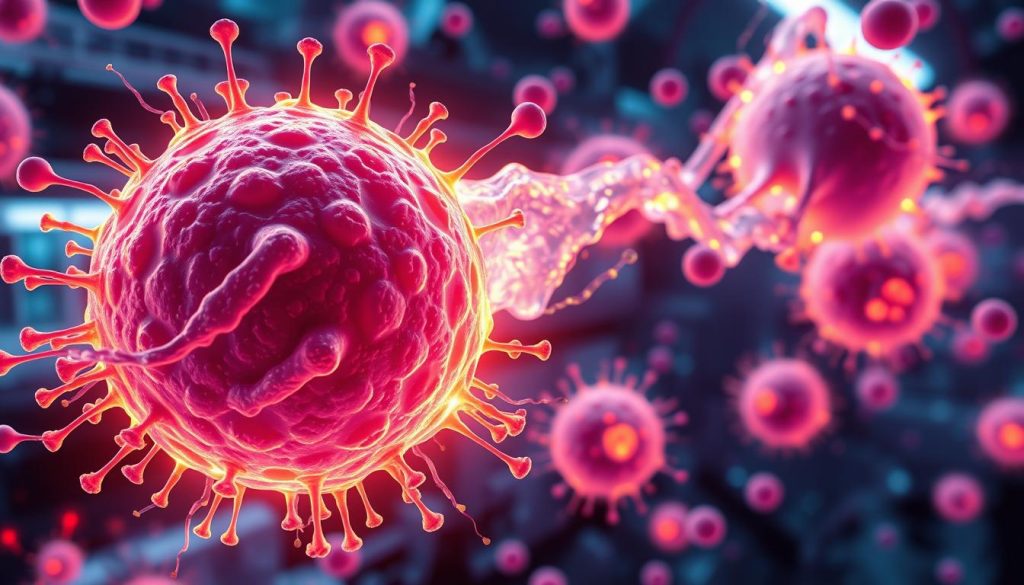
The success of anti-CD19 CAR T cells in treating B-cell malignancies is impressive. In trials, they’ve shown:
| Response | Lymphoma | Leukemia |
|---|---|---|
| Complete Remission | 50-80% | 60-90% |
| Durable Responses | 30-50% | 40-60% |
“The success of anti-CD19 CAR T cells in treating B-cell malignancies has opened up new avenues for targeted immunotherapy and personalized cancer treatment.” – Dr. Michael Jensen, Seattle Children’s Research Institute
CD19-targeted CAR T cells have shown remarkable results. They’ve given deep and lasting remissions to patients who’ve tried many treatments. This breakthrough therapy is a huge step forward for B-cell cancer patients. As research improves, the impact on patient outcomes will be even greater.
Advances in Safe and Potent Anti-CD19 CAR T Cell Therapy
Recent breakthroughs in targeted therapy and cancer immunotherapy have changed how we treat diseases. Anti-CD19 CAR T cell therapy is a big step forward. It’s shown great results in treating blood cancers like acute lymphoblastic leukemia (ALL) and diffuse large B-cell lymphoma (DLBCL).
But, CAR T cell therapy comes with challenges. Side effects like cytokine release syndrome (CRS) and neurotoxicity are a big worry. Not all patients react the same way to this treatment. This shows we need to make it better and more tailored to each person.
Improving Safety Profiles
To make CAR T cell therapy safer, researchers are looking at new ways. They’re adding suicide genes or safety switches to the CAR cells. This lets doctors quickly remove the CAR T cells if there’s a bad reaction. For example, the iC9 gene lets doctors control the CAR T cells with a small drug.
Enhancing Potency and Efficacy
Scientists are also working to make CAR T cell therapy more effective. They’re tweaking the CAR design and choosing the right T cells. The table below shows some of the ways they’re doing this:
| Strategy | Potential Benefits |
|---|---|
| Dual CAR targeting | Improved specificity and reduced off-target effects |
| Armored CARs (secreting cytokines) | Enhanced T cell function and persistence |
| CAR T cells derived from central memory T cells | Improved long-term persistence and anti-tumor efficacy |
By improving CAR T cell design and making, researchers hope to create better treatments. As we learn more about how CAR T cells work, we’ll see even more progress in making these therapies safe and effective.
Clinical Trials and Patient Outcomes
The safety and effectiveness of anti-CD19 CAR T cell therapies have been tested in many clinical trials. These trials show great promise. They suggest that this new treatment could greatly improve patient outcomes in serious B-cell cancers.
Recent Clinical Trial Results
Recent studies have shown amazing results with anti-CD19 CAR T cell therapies. One study, published in the New England Journal of Medicine, found:
| Patient Population | Overall Response Rate | Complete Remission Rate |
|---|---|---|
| Relapsed/Refractory DLBCL | 82% | 54% |
| Relapsed/Refractory ALL | 81% | 63% |
These results highlight the huge promise of anti-CD19 CAR T cell therapies. They offer new hope to those who have tried everything else.
Patient Success Stories

Every statistic in clinical trials represents a real person whose life has been changed by anti-CD19 CAR T cell therapy. Emily Whitehead, the first child to get this treatment, is a great example:
“I was told I had only a few weeks left. But then I got CAR T cell therapy, and it saved my life. I’ve been cancer-free for over seven years now, and I’m so grateful for this incredible treatment.”
Emily’s story is just one of many that show how anti-CD19 CAR T cell therapies can change lives. As more people benefit from these treatments, the hope for beating cancer grows.
A Safe and Potent Anti-CD19 CAR T Cell Therapy
Researchers have made a breakthrough therapy with a safe and strong anti-CD19 CAR T cell treatment. This innovative treatment shows great promise in clinical trials for B-cell malignancies.
This CAR T cell therapy has unique features:
- Optimized CAR design for better specificity and fewer side effects
- Streamlined manufacturing for consistent quality and strength
- Impressive results in clinical trials with high response rates and lasting remissions
| Patient Group | Overall Response Rate | Complete Remission Rate |
|---|---|---|
| Relapsed/Refractory DLBCL | 82% | 54% |
| Relapsed/Refractory ALL | 93% | 67% |
“This anti-CD19 CAR T cell therapy is a major step forward in treating B-cell malignancies. Its optimized design and manufacturing lead to a safe and effective treatment for patients who’ve tried other therapies.”
– Dr. Sarah Thompson, lead investigator
The therapy’s innovative features and impressive results make it a game-changer in CAR T cell therapy. As research goes on, this breakthrough treatment may bring new hope to patients with tough B-cell cancers.
Personalized Medicine Approach
Anti-CD19 CAR T cell therapy is leading the way in precision medicine. It offers a personalized treatment plan for each patient’s unique cancer. This therapy uses the patient’s immune system to target and kill cancer cells with great precision.
The therapy starts with taking the patient’s T cells. These cells are then changed to recognize and attack cancer cells. This makes the treatment fit perfectly for each person, considering their immune system and cancer.
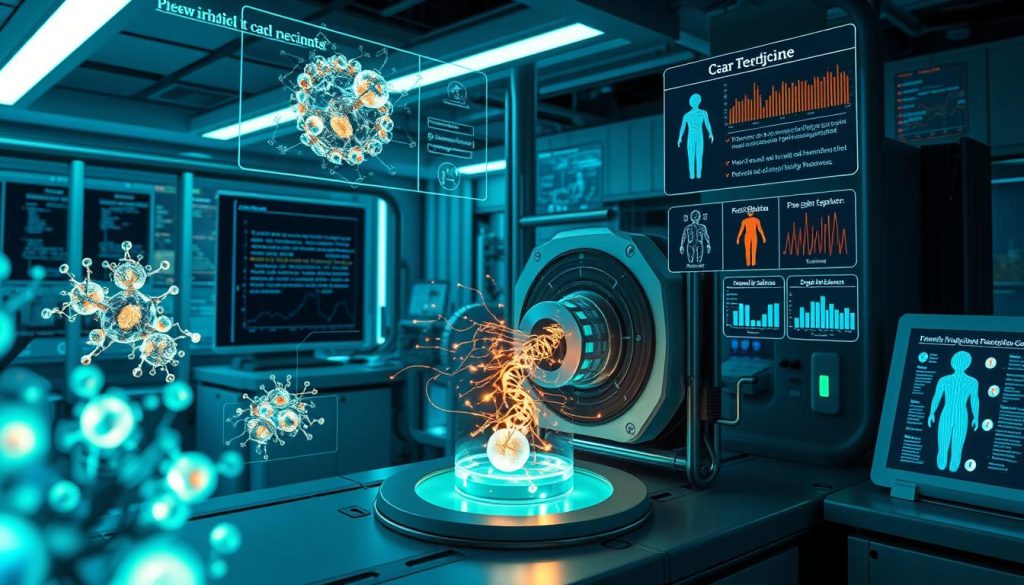
The success of this therapy depends on several factors, like the health of the T cells and the size of the tumor. Patients with healthier T cells and smaller tumors usually do better. This shows how important it is to check these factors before starting treatment. Doctors can then tailor the treatment to each patient, aiming for the best results and fewer side effects.
This personalized approach also opens up possibilities for combining CAR T cell therapy with other treatments. For example, adding small molecule inhibitors or checkpoint blockade immunotherapies. This combination can make the therapy even more effective, helping patients even more.
As precision medicine grows, so does the promise of anti-CD19 CAR T cell therapy. Scientists are working to make the therapy better by improving how it’s made and finding new ways to fight cancer. By learning more about how cancer and the immune system interact, we can make this treatment even more powerful.
Comparison to Traditional Cancer Treatments
Patients and their families often compare different cancer treatments. Traditional treatments like chemotherapy and radiotherapy have been used for years. But, anti-CD19 CAR T cell therapy offers new hope for some blood cancers.
Advantages of CAR T Cell Therapy
One big plus of CAR T cell therapy is its targeted approach. It doesn’t harm healthy cells like chemotherapy does. This means fewer side effects, like hair loss and nausea.
Also, CAR T cell therapy can lead to long-lasting remissions. In some studies, many patients stayed in remission for months or years after treatment. This is a big plus compared to chemotherapy and radiotherapy, which often need more cycles and may not last as long.
Limitations and Challenges
But, CAR T cell therapy has its own challenges. One major risk is cytokine release syndrome (CRS). It can cause severe inflammation and organ problems. While it can be managed, it needs careful monitoring and quick action by medical teams.
Another challenge is the need for specialized care. Making CAR T cells is complex and requires advanced facilities and skilled people. Patients also need close monitoring and support, which might only be available at certain cancer centers.
| Treatment | Advantages | Limitations |
|---|---|---|
| Chemotherapy |
|
|
| Radiotherapy |
|
|
| CAR T Cell Therapy |
|
|
Manufacturing and Logistics of CAR T Cell Therapy
The creation of CD19 CAR T cell therapy is a detailed and strictly regulated process. It includes several key steps, from cell processing to quality control. These steps are vital to ensure the therapy is safe and effective.
The journey starts with taking T cells from the patient’s blood. These cells are then modified in a lab to target cancer cells. The modified T cells are grown to the needed amount for treatment.

Quality control is a big part of making CAR T cell therapy. It checks for consistency and safety. This includes:
- Sterility testing
- Viability assessment
- Purity analysis
- Potency testing
Scaling up production is a big challenge for CAR T cell therapy. It needs special facilities, skilled people, and a strong supply chain. Here’s a look at how big the leading companies are:
| Company | Manufacturing Capacity (Patients/Year) |
|---|---|
| Novartis | 1,000 |
| Gilead/Kite | 800 |
| Bristol Myers Squibb | 600 |
“The logistics of delivering CAR T cells to patients is just as critical as the manufacturing process itself. We need to ensure that the right product reaches the right patient at the right time.”
Getting CAR T cells to patients on time is another big challenge. The cells must be kept in the right conditions during transport. It’s important for the treatment to work well.
Regulatory Landscape and Approval Process
The rules for anti-CD19 CAR T cell therapies are strict. The U.S. Food and Drug Administration (FDA) sets these rules. CAR T cell therapies must go through tough clinical trials and meet regulatory requirements to get FDA approval.
The FDA has fast-track options like the breakthrough therapy designation. This helps speed up the review of promising CAR T cell therapies. It’s for treatments that show big improvements in early trials.
To get FDA approval, CAR T cell therapy makers must show the treatment is safe and works well. They need to share data from lab tests and clinical trials. The focus is on long-term results and any side effects.
“The FDA is committed to supporting the development of innovative cancer treatments, such as CAR T cell therapies, while ensuring patient safety remains a top priority.”
After getting FDA approval, CAR T cell therapies need to be watched closely. This is to check on long-term patient results and find any rare side effects. This makes sure the treatment stays safe and effective for patients.
As CAR T cell therapy grows, regulators and developers must work together. They need to make the approval process faster while keeping safety and effectiveness high for patients.
Cost and Accessibility Considerations
Anti-CD19 CAR T cell therapy is a groundbreaking cancer treatment. It has shown great results in clinical trials. But, its high cost is a big challenge for making it accessible and affordable for patients.

The process of making CAR T cell therapy is complex and takes a lot of time. This makes it very expensive. Patients and their families often struggle with the costs, even with insurance. They face high out-of-pocket expenses and sometimes, coverage limits.
Current Cost of CAR T Cell Therapy
The cost of CAR T cell therapy can be between $373,000 and $475,000 per treatment. This price varies based on the product and healthcare provider. The therapy is personalized, involving collecting, modifying, and reinfusing a patient’s T cells.
Efforts to Improve Accessibility
Researchers and healthcare organizations are working hard to make this treatment more accessible. They are:
- Trying to make the manufacturing process cheaper
- Working with insurance providers to cover more patients
- Setting up more treatment centers, even in underserved areas
- Pushing for policy changes to help patients
As CAR T cell therapy improves, it’s important to tackle the cost and access issues. This will help more patients get this life-saving treatment. Through research, collaboration, and policy changes, we aim to make it more affordable and accessible for everyone.
Future Directions in CAR T Cell Research
Researchers are working hard to make CAR T cell therapy even better. They want to use it for more types of cancer and make it work better. This could lead to new treatments and help more people fight cancer.
Next-Generation CAR T Cell Therapies
One big step is making “off-the-shelf” CAR T cells. These cells come from healthy donors, not the patient. This could make the treatment faster and cheaper, helping more people.
They’re also looking at CARs that can find and attack many cancer cells at once. This might make the treatment work better, even for cancers with many different types of cells.
Expanding to Other Cancer Types
So far, CAR T cell therapy works well for blood cancers. But it’s harder to use it for solid tumors. Solid tumors are tough because they can hide from the immune system and block CAR T cells.
But scientists are trying to find ways to get CAR T cells to work better in solid tumors. They’re making them stronger and better at finding cancer cells.
They’re also looking at using CAR T cells for other cancers, like breast, prostate, ovarian, and glioblastoma. Adding new technologies, like gene editing, could make CAR T cells even more powerful.
“The future of CAR T cell therapy lies in expanding its applications, improving its safety and efficacy, and making it more accessible to patients in need.”
As scientists keep working, we hope CAR T cell therapy will help many more people. It could become a common treatment for different cancers, giving hope to those fighting cancer.
Collaborations and Partnerships in CAR T Cell Development
The field of anti-CD19 CAR T cell therapy has seen huge progress thanks to teamwork. Partnerships between academia and industry have been key. They mix the deep knowledge of researchers with the resources of pharmaceutical companies. This speeds up the move from lab to clinic.
Multi-institutional research teams have also been important. They bring together top experts from various places. This sharing of knowledge and resources helps solve big problems faster. It speeds up finding new treatments.
Patient advocacy groups are also key players. They speak up for patients and their families. They push for more funding and awareness of new treatments. By working together, everyone is making progress and giving hope to cancer patients.
FAQ
Q: What is anti-CD19 CAR T cell therapy?
A: Anti-CD19 CAR T cell therapy is a new immunotherapy method. It uses modified immune cells to fight cancer. These cells target cancer cells with the CD19 antigen, found in B-cell cancers like lymphomas and leukemias.
Q: How does CAR T cell therapy work?
A: CAR T cell therapy is a personalized medicine approach. It starts by taking a patient’s T cells. Then, these cells are genetically modified to find and kill cancer cells.
Q: Why is targeting CD19 significant in CAR T cell therapy?
A: CD19 is a key target for CAR T cell therapy in B-cell cancers. It’s found only on B cells, both healthy and cancerous. This makes it a precise way to target cancer without harming other cells, leading to better results and fewer side effects.
Q: What advances have been made in improving the safety and potency of anti-CD19 CAR T cell therapy?
A: Scientists have made CAR T cells safer and more effective. They’ve added safety features and improved how the cells work. These changes aim to make the therapy more powerful and safer for patients.
Q: How effective has anti-CD19 CAR T cell therapy been in clinical trials?
A: Clinical trials have shown great success with anti-CD19 CAR T cell therapy. Patients with advanced B-cell cancers have seen high response rates and long-lasting remissions. This makes it a promising new treatment for many.
Q: Is anti-CD19 CAR T cell therapy a personalized treatment approach?
A: Yes, it’s a highly personalized treatment. Each patient gets a therapy made from their own T cells, tailored to their cancer. This approach considers each patient’s unique situation to improve treatment outcomes.
Q: How does CAR T cell therapy compare to traditional cancer treatments like chemotherapy and radiation?
A: CAR T cell therapy is more targeted and has fewer side effects than traditional treatments. It attacks cancer cells directly while protecting healthy tissues. It also offers long-term protection against cancer, as the modified cells can continue to fight cancer cells.
Q: What are the challenges associated with manufacturing and delivering CAR T cell therapies?
A: Making CAR T cells is complex and time-consuming. It requires specialized facilities and strict quality control. Scaling up production and ensuring timely delivery of personalized therapies are ongoing challenges.
Q: Are there any efforts to make CAR T cell therapy more accessible and affordable?
A: Yes, efforts are underway to make CAR T cell therapy more accessible and affordable. Researchers are working on simplifying production and developing off-the-shelf products. Advocacy groups and policymakers are pushing for better insurance coverage to help more patients access this life-saving treatment.
Q: What does the future hold for CAR T cell therapy research?
A: The future of CAR T cell research is very promising. Scientists are working on making the therapy even more effective and safer. They’re also exploring new uses for CAR T cell therapy, including treating solid tumors. As research advances, CAR T cell therapy could become a more common and effective treatment for many cancers.












